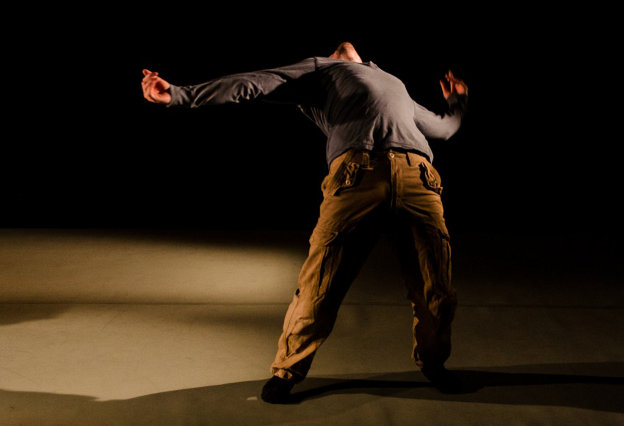A tiny theatre, in a quirky pub in Kentish Town, on a lazy Sunday afternoon, hosted the first of what will be a monthly programme of Cloud Dance Sundays. Confronting harrowing subject matter, the billing was far from laid back, proving that Cloud Dance is serious in its initiative to reach new audiences (an ambition it achieved, on its first outing, by pulling in a mixture of locals and dance-bods to this unusual venue).
Rachel Burn’s Pull Through, Flick opened the programme trying, perhaps a little too hard, to be dark and dramatic. Burn’s dancers punched their chests, brushed the floor, and franticly whisked up the fabric of their tunics in a scene of frustrated anguish, a ritual of the tortured soul. The trio of dancers slowly progressed on a journey that circled the stage, returning to the dark corner from which they emerged, now bathed in light. As they dropped in and out of solos and duets, their cramped spatial compositions would have benefited from performance in a larger space.
John Ross choreographed and performed Man Down, an intense solo that suited the intimate surroundings of the Giant Olive Theatre. The story of a soldier who was posted to Afghanistan and did not return was told through the voice of his comrade in a form of dance integrated with oral history. The recorded words engaged the audience in a story that, for the sake of the speaker, needed to be told. The isolation of a soldier at war, both voiced and embodied, became a cleansing ritual for the man whose words were spoken. Listening, commanding, watching, waiting, Ross evoked the energy, strength and physicality of a soldier, marrying this brutality with a sensitive vocabulary that was first and foremost dance. Using a pen to draw a bullet wound on the chest and turning to reveal its exit mark, created a tension between the enormity of death and the inability to recreate such a scene. The lightness of the act of drawing and the closeness of the man stood before the audience evoked a sense of life’s fragility without undermining the event.
On trend in its interdisciplinary nature and popular subject matter, Tom Jackson Greaves’ Vanity Fowl portrayed the trials and tribulations of youth culture using video projections to propel the audience back and forth from intimate interactions with the soloist to a busy bar scene. Greaves introduced himself with the longest, firmest, funniest handshake whilst the use of voiceovers placed the audience in a role that identified the thoughts and insecurities of the soloist. Social interactions informed a rich vocabulary of intricate gestures and showy high kicks alternating between a boy riddled with doubt and a peacock on parade. Greaves’ charisma was the strongest part of this piece, making the light-hearted scenes the most successful. However, the curation let him down a little here, as the unfortunate billing after Man Downmeant Greaves’ journey through vanity and disgrace felt crass in comparison to a man’s journey through war.
Cloud Dance Sundays is an ideal platform for emerging choreographers, and, more specifically, pieces with personality and charm. Unconventional pieces with the presence and individuality to exist within the intimacy demanded by the venue will be the most successful in this context. This expectation, set byMan Down, will hopefully be fulfilled by each monthly event.

